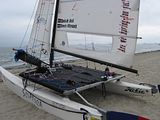iclickjohn-
First and foremost, if this is something that really "stirs the soul" for you, then absolutely stick with it.
I won't bore you with my life story, but was at a similar stage 18 months ago as I was a total newbie to my H18. I had sailed a bit back in my college days (a bit over 20yrs ago), but I let life, kids, etc. get in the way. Since purchasing the boat, I decided to educate myself (reading lots and lots of books) as much as possible on everything from the basics to the finer points of catamaran sailing. What I have been able to accomplish in the last year was progress from barely being able to rig the boat, to racing with some experienced sailors in big wind/waves out on Lake Michigan, Saginaw bay, etc. <without> any swimming adventures.
The point is that these boats are not that hard to sail, and with a little-bit of patience and training you can get yourself to the point of feeling comfortable in conditions that would have made you pale a few months/years earlier. I
still have a lot to learn and I make mistakes (going into irons at the start of the race on the wrong side of the committee boat while Mr. Bounds looked on

).
From a process standpoint, for me, I found that at first it required a lot of "thinking" while doing. This was a tough stage for me as it can be nerve-racking worrying about making a mistake, fumbling with the lines, etc. The thinking-while-doing process is inherently slow, and speed is of the essence when maneuvering a cat. However, lots of continued experience trains the brain and muscles to do things instinctively without thinking about it, allowing you to execute quickly. This allows the grey stuff between your ears the luxury of worrying about higher level things. For me, I can now feel the puff on my cheek, or notice the change in pitch of the boat long before it starts to fly a hull, and now automatically sheet out a bit or feather up into the wind. In the past, I had to think about it. Now that part is almost automatic and I can move on to more high-level things like race tactics, watching/planning for wind shifts, surfing waves the right way, etc.
What the other guys say about starting slowly is spot-on. You need a bit of a safety net at first. If you can't move the boat to an inland lake, then choose days where you have a good solid forecast and a mild on-shore breeze (onshore breeze should be less puffy). I would absolutely buy/bring a VHF radio in case something goes wrong (you can get portable waterproof units for less than $100). Perhaps having someone on shore with a radio is a good idea as well. Making sure someone in shore is watching or know when to expect you is important. Dress appropriately. Hypothermia is no fun.
Again, as long as its important to you, I'd encourage you to give it a go.
Cheers
(BTW, the
CRAM group will be racing up at Tawas point state park this weekend if you want to stop by!)










